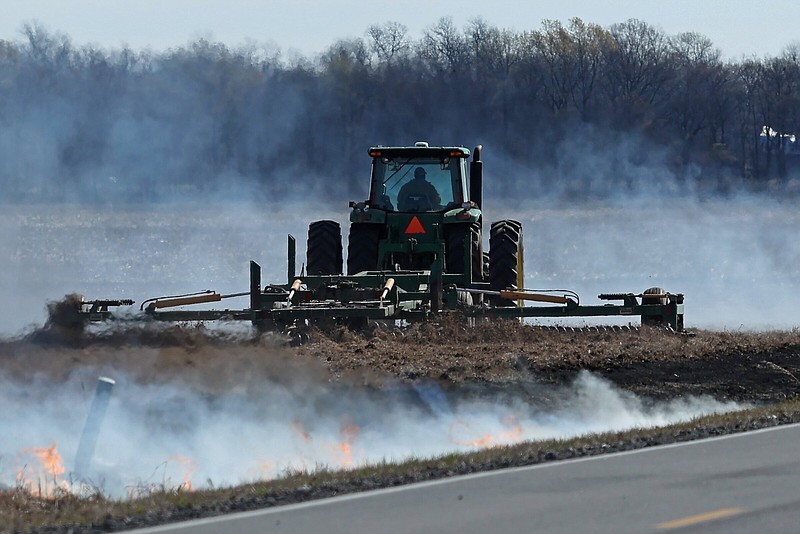A bill that would create an income tax credit incentive for farmers who sell or rent agricultural assets -- like land, livestock, buildings and facilities or machinery -- to beginning farmers is scheduled to go before the House Taxation and Revenue Committee on Tuesday.
House Bill 1003, filed in November by Rep. Julie Mayberry, R-Hensley, was first proposed during the 2021 legislative session by former Rep. Joe Jett, R-Success -- a former committee chairman -- but it stalled in committee.
"We never voted on the bill," said Mayberry, who is a vice-chairwoman on the committee. "I think we'll have the same situation this time, we will wait until the very end, until we have a better idea of what our budget is and how many taxes we might be able to vote on to let out of committee.
"If you look at the number of tax credit bills that we have, it's an unbelievable amount, so after a criminal justice reform bill that is supposed to be filed this coming week, we're waiting on it, and we need to see how much that's going to affect our budget," Mayberry said.
She said the fiscal impact of the recently passed LEARNS Act on the state's budget has already been determined, but the fiscal impact of the proposed sentencing bill is not yet determined.
"There's also a push to lower our income tax rate and how much does that affect our budget, so the Revenue and Tax Committee is kind of waiting on all these other tax credit or incentive bills until the very end so we can see how much money we have left over," Mayberry said.
The bill's intent is to attract more farmers to the agricultural industry.
Similar concerns for young farmers can be found in legislative documentation related to similar bills in other states; barriers range from health care access, land affordability and student loan debt to smaller operations resulting in smaller profits.
There are 42,625 farmers in Arkansas, and of those, 2.5% are under age 25; 14% are over 75; and 64% are over 55 years old, Mayberry said.
Agriculture in Arkansas generates about $19 billion annually, which is about 14% of the state's gross domestic product, according to the University of Arkansas's Arkansas Agriculture Profile for 2022.
Iowa, Kentucky, Minnesota, Nebraska, Pennsylvania and, more recently, Ohio have passed similar beginning-farmer tax credit measures.
Wisconsin had a beginning farmer tax credit on the books that ended in 2013.
The bill states the total amount of state income tax credits awarded will be capped at $10 million per year and the tax credits would be issued on a first-come, first-served basis.
This is one of the few differences between the bill proposed this year and the one proposed in 2021.
"Last time, our [Department of Finance and Administration] estimated the revenue impact to be $12 million a year, and some members were a little concerned that there wasn't a cap on that, putting caps on some of these things helps us with the budget," Mayberry said.
"We might make that lower, we could make it higher."
The proposed income tax credit amounts for owners who rent or sell agricultural assets to beginning farmers are 5% of the sale price of an agricultural asset; 10% of the gross rental income received during the first three years of the rental agreement; and 15% of the cash equivalent of the gross rental income received during the first three years of a share rent agreement.
Financial literacy and mentorship programs for young farmers were added to the bill, driving home the point that younger farmers need assistance and education to succeed.
Beginning farmers who take part in a financial management program could get a tax credit -- an estimated one-time payment of up to $1,500 that could be redeemed for up to three years -- according to a fiscal impact report attached to the bill.
"An important part of this bill is that we're not only helping a beginning farmer get started and helping a more mature farmer sell off property or rent off property or even equipment, we're helping both, but it does create sort of a mentorship between the two, and the beginning farmer may know how to farm, but may not know all of the financial parts of running a successful business," Mayberry said.
The two proposed income tax credits are projected to result in a $6.1 million reduction in general revenues for the state in fiscal year 2024 and will cost $10 million in fiscal years 2025 and beyond.
The income tax credit would be effective for tax years beginning on or after Jan. 1, 2024.
Another bill aimed at helping young people engage with Arkansas's agricultural industry, House Bill 1336, was signed into law on March 10. It creates an agricultural education pilot program in six public elementary schools starting in the 2025-26 academic year and includes the hiring of agricultural education teachers.
